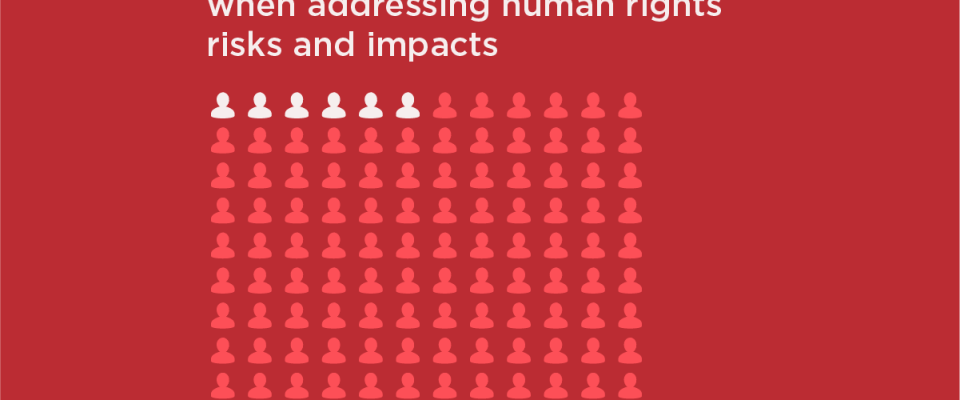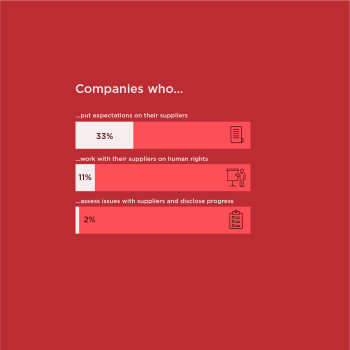Key finding
Companies need to translate their commitments to stakeholder engagement into meaningful action

Engaging with stakeholders such as communities, vulnerable and marginalised groups, human rights defenders, trade unions and grassroots organisations should be ongoing, and should inform a company’s human rights approach. By engaging with workers, for example, a company could better understand factors that contribute to negative human rights impacts, such as excessive working hours, and address the issue effectively. Meaningful stakeholder engagement is also essential for companies to ensure that their actions to address negative impacts are tailored to stakeholders’ needs and experiences.
The updated Corporate Human Rights Benchmark methodology requires companies to better integrate stakeholder engagement across several indicators. The indicator on commitment to stakeholder engagement was replaced with an integrated focus on the types of engagement undertaken at the various stages of a business’ operations.
In the 2020 Corporate Human Rights Benchmark, 66% of companies assessed committed to engage with affected stakeholders. Results from this year’s assessment demonstrate that companies have yet to translate this commitment into action. For example, 71% of companies scored zero on their approach to engaging with affected stakeholders on a regular basis (B.1.8).
In terms of human rights due diligence, almost a quarter of companies (23%) described how they engage with affected stakeholders when identifying their human rights risk and impacts (B.2.1). However, the majority of companies fail to include stakeholders in the subsequent steps of a due diligence process, with less than 5% describing how they involve affected stakeholders in the assessment of negative risks and impacts, decisions about actions to take in response to salient human rights issues, evaluating the effectiveness of actions over time or communicating negative impacts (B.2.2-B.2.5). Two companies that positively stood out when it comes to engaging with affected stakeholders as part of their human rights due diligence were Unilever and The Hershey Co.
In terms of grievance mechanisms, 91% of companies did not disclose that they engage with potential or actual users, such as workers and affected communities, on the design, implementation, performance and improvement of their mechanisms (C.3). Apple positively stood out for its stakeholder engagement regarding grievance mechanisms.
While the OECD Due Diligence Guidance for Responsible Business Conduct outlines the need for companies to carry out meaningful stakeholder engagement as part of continuing due diligence, there are ongoing debates as to how this should concretely be translated into national laws. The dataset from the CHRB on stakeholder engagement and grievance mechanisms feeds into the current negotiations on the EU Corporate Sustainability Due Diligence Directive as to the regulatory gap concerning these elements of due diligence and whether there is a need to mandate appropriate measures. Our findings indicate that stakeholder engagement has yet to inform most companies’ human rights approach. Forthcoming regulations and subsequent national laws should therefore include strong stakeholder engagement requirements to ensure that companies’ decisions and actions are guided by the voices of those most impacted.
